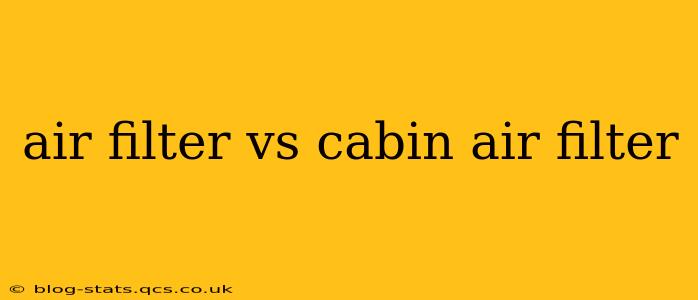Choosing the right filter for your vehicle is crucial for both performance and health. Many drivers confuse engine air filters with cabin air filters, leading to potential problems. This comprehensive guide will clarify the differences between these two essential components, helping you make informed decisions about your vehicle's maintenance.
What is an Engine Air Filter?
The engine air filter is responsible for protecting your vehicle's engine from harmful contaminants present in the outside air. Located within the engine compartment, typically near the engine itself, it cleans the air before it enters the combustion chamber. This prevents dirt, dust, pollen, and other debris from damaging sensitive engine parts, improving its lifespan and efficiency. A clogged engine air filter restricts airflow, reducing engine performance and potentially impacting fuel economy. Replacing it regularly, as recommended in your owner's manual, is vital for optimal engine health.
What is a Cabin Air Filter?
The cabin air filter, also known as an in-cabin air filter or HVAC filter, is responsible for filtering the air that enters your vehicle's cabin. This filter sits within your car's HVAC (Heating, Ventilation, and Air Conditioning) system and cleans the air before it's circulated throughout the passenger compartment. It removes dust, pollen, mold spores, and other airborne particles, improving air quality and protecting passengers from potential allergens and irritants. A dirty cabin air filter can reduce the efficiency of your climate control system, lead to musty odors, and even exacerbate allergies or respiratory issues for occupants.
What are the Key Differences Between Engine and Cabin Air Filters?
The most significant difference lies in their location and function. The engine air filter protects the engine, while the cabin air filter protects the occupants. They also have different filter media and construction, tailored to their specific purposes. Engine air filters often use a denser material to trap larger particles, whereas cabin air filters may utilize a finer filter media to trap smaller particles like pollen and allergens. Finally, their replacement schedules often differ, with cabin air filters frequently requiring replacement more often than engine air filters.
How Often Should I Replace My Air Filters?
H2: How often should I replace my engine air filter?
The recommended replacement interval for your engine air filter varies depending on your vehicle's make, model, and driving conditions. Consult your owner's manual for the manufacturer's recommended schedule. Generally, you should replace it every 12,000 to 15,000 miles or every year, whichever comes first. However, if you frequently drive in dusty or dirty conditions, more frequent replacements may be necessary. Observe the filter's condition; if it appears significantly dirty or clogged, replacement is warranted.
H2: How often should I replace my cabin air filter?
Similar to engine air filters, the replacement schedule for your cabin air filter depends on your vehicle and driving conditions. The manufacturer's recommendation is usually found in your owner's manual. However, many experts suggest replacing it every 12,000 to 20,000 miles or every 12 to 24 months. If you notice musty odors from the vents, reduced airflow from the climate control system, or experience increased allergies or respiratory irritation while in the vehicle, it’s time for a replacement.
What Happens If I Don't Replace My Air Filters?
Neglecting air filter replacements can lead to several problems. A clogged engine air filter will restrict airflow to the engine, impacting performance, fuel economy, and potentially damaging the engine over time. A dirty cabin air filter reduces air quality, leading to unpleasant odors, decreased HVAC system efficiency, and potential health issues for passengers due to the circulation of allergens and irritants.
Can I Clean My Air Filters?
Some air filters, particularly older or less sophisticated designs, might be somewhat cleanable. However, it's generally not recommended to attempt cleaning either engine or cabin air filters. Cleaning usually doesn't remove all the contaminants, and you risk damaging the filter media, compromising its effectiveness. Replacing the filters is far more effective and cost-efficient in the long run.
This guide provides a comprehensive overview of engine air filters and cabin air filters. Remember to always consult your owner's manual for specific recommendations regarding filter type, replacement intervals, and maintenance procedures for your vehicle. Regular maintenance is key to ensuring optimal engine performance and a healthy, comfortable driving environment.
